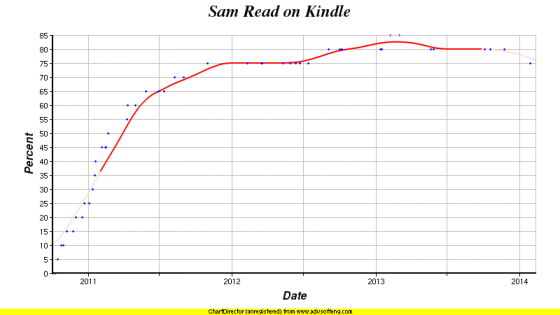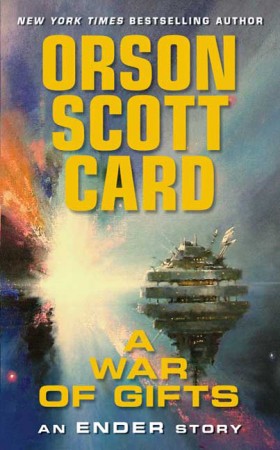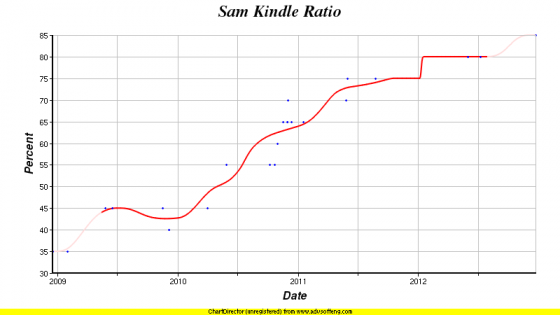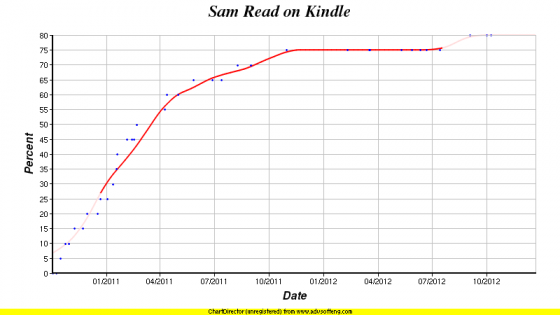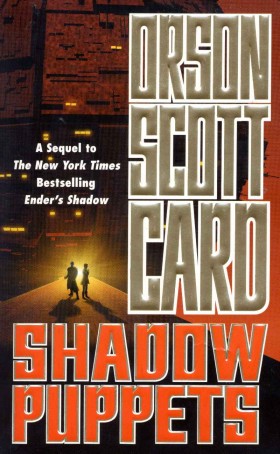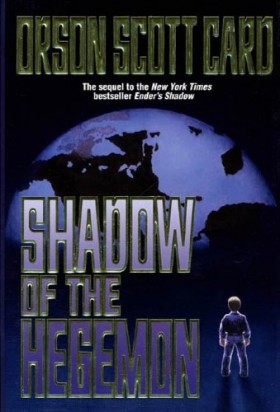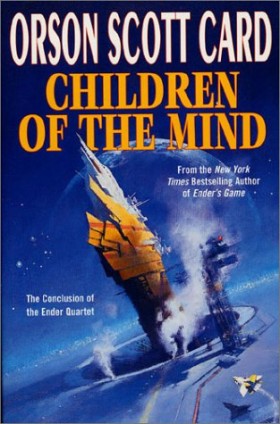I’ve fallen way too far behind on my little summaries of things I have read, so I’m switching methodologies. Instead of posting something for each book, I’ll do annual summaries. The last individual book I did was Envisioning Information which I read in February 2011, so I’ll start with 2011. I’ll do the whole year, even though it means backtracking a little bit.
Here goes, the books I finished in 2011:
- Nurtureshock by Bronson and Merryman [2009]: 2010-12-22 to 2011-01-03 (336p/13d=25.8p/d): A book about child development and parenting concentrating on places where research has shown results that are perhaps a bit counterintuitive. It was interesting.
- Shadow of the Giant by Orson Scott Card [2005]: 2011-01-03 to 2011-01-12 (6136L/10d=613L/d): The 9th book in the Ender series. One of the Bean ones. Continues the decline in the series. Still an entertaining read, but still a series that kept going past where it needed to.
- Fatal System Error by Joseph Menn [2010]: 2011-01-12 to 2011-01-18 (4589L/7d=656L/d): An investigation into internet organized crime. It followed investigations into a few rings of people responsible for DDOS attacks, cyber gambling, cyberwarfare. Interesting, and kinda scary.
- A War of Gifts by Orson Scott Card [2007]: 2011-01-18 to 2011-01-19 (1294L/2d=647L/d): the 10th book in the Ender series. More of a novella than a full novel. Very short. With a Christmas theme. Going back to Ender’s time in battle school. A rather odd addition to the series.
- All the President’s Men by Woodward and Bernstein [1974]: 2011-01-19 to 2011-02-05 (5862L/18d=325L/d): The classic recounting of the Watergate investigation. I found it interesting but a bit dry. I also found myself wishing it continued further in the story than it did.
- Ender in Exile by Orson Scott Card [2008]: 2011-02-05 to 2011-02-13 (380p/9d=42.2p/d): Book #11 of the Ender series. There are 15 now, with a 16th on the way, but this is the last of this series that I have read. This fills in a few gaps in Ender’s history. It was OK, but nothing special.
- Envisioning Information by Edward Tufte [1990]: 2011-02-13 to 2011-02-16 (126p/4d=31.5p/d): The second in Tufte’s series of books on similar topics. These are nice pretty books, but I think they are a bit overrated, and most of the points he makes were already made well in the first book. This is the last book I reviewed the old way.
- How to Live Safely in a Science Fictional Universe by Charles Yu [2010]: 2011-02-16 to 2011-02-21 (2877L/6d=480L/d): A bizarre little time travel story. Very impressionistic and dreamy. Everything seemed kind of foggy. It was never quite entirely clear what was happening. Or maybe I was just too dense to understand it. Anyway, not my kind of book at all. Can’t say that I liked it.
- Decision Points by George W. Bush [2010]: 2011-02-21 to 2011-04-09 (10840L/48d=226L/d): The second George Bush’s memoirs. Not really an autobiography, but just highlights of important “decision points” in his life. I actually liked it quite a bit. It humanized GWB quite a bit for me, and actually made me feel sorry for him. Although I know it was not his goal, but to me it left an impression of someone in over his head and swept away by events beyond his control.
- The Lion, the Witch and the Wardrobe by C. S. Lewis [1950]: 2011-04-09 to 2011-04-12 (1986L/4d=497L/d): The first (by original publication date) of the Narnia series. I think the last time I read this I was between 5th and 6th grade. It is VERY SHORT. A cute book though, despite the fact that the whole thing is just a thinly disguised religious allegory.
- Visual Explanations by Edward Tufte [1997]: 2011-04-12 to 2011-05-01 (156p/20d=7.80p/d): More of the same from Tufte. Once again full of nice visual artifacts. Once again makes a few good points. Once again makes some others I don’t buy so much.
- O by Anonymous [2011]: 2011-05-01 to 2011-05-27 (5881L/27d=218L/d): A novel based around a staffer on the campaign staff of a fictionalized Obama clone. It was perhaps intended to provide a little insight into what was going on in the campaign with a little added drama. But in the end it was mostly forgettable.
- The Cult of the Presidency by Gene Healy [2008]: 2011-05-27 to 2011-06-28 (4882L/33d=148L/d): An examination of the growth of executive power over the history of the United States, with a concentration on the 20th century. For those of us with a deep suspicion of concentration of power… any concentration of power… it is a disturbing history. But most importantly it shows the ratcheting nature of such things. Powers once taken are rarely ceded again without a major crisis. Especially relevant in post-9/11 America.
- Dying of the Light by George R. R. Martin [1977]: 2011-06-28 to 2011-07-13 (6591L/16d=412L/d): Martin’s first novel, long before the days of Game of Thrones. It is about the last few groups of people on a dying planet. I haven’t read any of the later series, but if this first effort is a taste of what is to come later, I understand what people got excited about. This was a good old fashioned fun Scifi romp. I enjoyed it and look forward to reading more by Martin.
- How to Measure Anything by Douglas W. Hubbard [2010]: 2011-07-13 to 2011-08-09 (6328L/28d=226L/d): This is a book about how to use various techniques to produce reasonable quantitative estimates of almost anything, including modeling the uncertainty in those estimates. Indeed, it makes the strong point that any estimate without a confidence interval is worse than useless. I found much of what this book had to say immediately useful, and put much of it into practice in things I did both at work and at home. Highly recommended.
- The Girl Who Circumnavigated Fairyland in a Ship of Her Own Making by Catherynne M. Valente [2011]: 2011-08-09 to 2011-09-01 (4273L/25d=171L/d): Structured like a more modern day Alice in Wonderland, this is also a story of a young girl traveling through a bizarre fairyland with strange rules for how things work. It was interesting, and had some cute bits, but it was perhaps a bit TOO whimsical and non-sensical for my tastes. Just not my cup of tea, although I can see why some would like it.
- The Origin of Species by Charles Darwin [1859]: 2011-09-01 to 2011-10-31 (9403L/61d=154L/d): I don’t know what possessed me to read this. Historical curiosity I guess. It is a tour de force of classical science and all. It is also extremely dry and slow moving. Not exactly a compelling page turner. And of course in most circles, no longer controversial or radical. Subsequent science has of course refined details and corrected bits and pieces, but the fundamental concepts survive basically intact. It was good to read it, but there are much more accessible modern overviews of evolutionary theory out there for those who want it.
And that was it for 2011. The book I started on October 31st wasn’t finished before the end of the year.
When I did the individual reviews, I had also been including charts for how many of the last 20 books I reviewed were available on Kindle, and how many of the last 20 books I have read I have read on Kindle. Using this new model, obviously the first is no longer really viable, so even though that ratio hadn’t yet reached the 90% at which I’d said I would stop, I will stop anyway.
I can still do the chart of what percentage of the last 20 books read have been read on Kindle. As of today (so including books finished not just in 2011, but also 2012, 2013 and so far in 2014) and starting from the day I first got a Kindle, it looks like this:
As you can see, this percentage peaked at 85% in early 2013 and has actually declined back down to 75% at the moment. 5 of the last 20 books I have read have been physical books. I find at this point that when I hit a physical book my reading slows down considerably, just because of the extra burden of having to carry the thing around. I am sure this percentage will go back up again, but as long as I keep occasionally reading physical books that have been gifted to me (or I occasionally choose a physical book I have owned for years) it will be hard for this to get up to 100%. For that to happen I would need to not just avoid buying new physical books (I already do that) but actually reject the possibility of physical books when they do come up. I’m not quite ready to do that.
In the future, I may separate out these Kindle Ratio graphs from any reviews I do. Or I may not post any more updates of the graph. Depends what I feel like later. :-)
Not sure when I’ll do the 2012 books. Someday.
